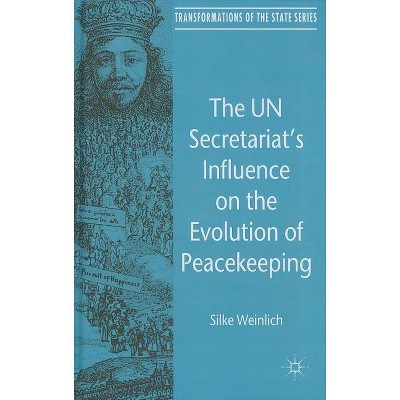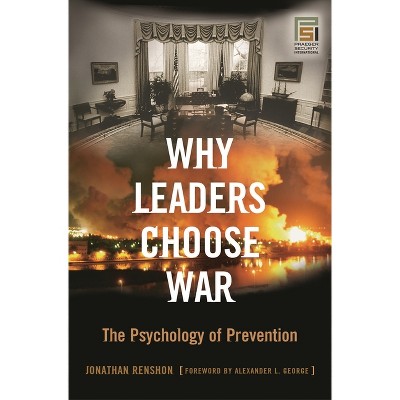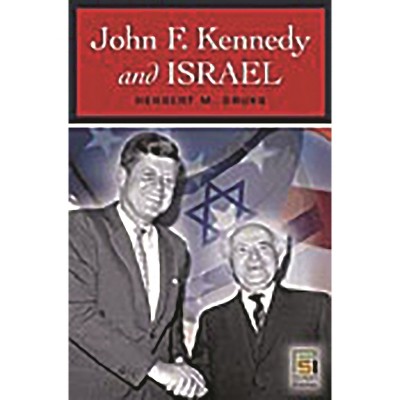Sponsored

UN Peacekeeping - (Praeger Security International) by Andrzej Sitkowski (Hardcover)
In Stock
Sponsored
About this item
Highlights
- In this book, Andrzej Sitkowski confronts two basic peacekeeping myths.
- About the Author: Andrzej Sitkowski is an independent researcher who has worked with the UN as a consultant, advisor, and staff member for 18 years.
- 208 Pages
- Political Science, Security (National & International)
- Series Name: Praeger Security International
Description
About the Book
In this book, Andrzej Sitkowski confronts two basic peacekeeping myths. First, the belief that peacekeeping is separate from peace enforcement blurs this difference and undermines the viability of peacekeeping operations. Secondly, it is widely believed that the peacekeepers are allowed to apply force only in self-defense and lack the authorization to use it in defending UN Security Councils mandates. Solidly anchored in official primary sources originating from the UN, national governments, parliamentary inquiries (Dutch, French, and Belgian) and from the International Criminal Tribunal on Rwanda, this book integrates the most recent recommendations related to peacekeeping. It exposes how the UN peacekeeping syndrome of soldiers safety first crept into the NATO's strategy and compromises its missions in Kosovo and Afghanistan.
The peacekeeping system has largely outlived its usefulness and is bound to fail when applied to currently predominant violent and messy conflagrations. Lacking radical changes in that system, the UN should disarm, restricting the peacekeeping to military observers' missions and to subcontracting other operations out to military alliances and regional organizations. The widely lamented massacres of innocent civilians under UN Peacekeeper eyes in Rwanda, Srebrenica, and the Congo influenced neither the UN's approach nor the analysis of the methods. In this book, Andrzej Sitkowski confronts two basic peacekeeping myths. First, the belief that peacekeeping is distinct from peace enforcement blurs this distinction and undermines the viability of peacekeeping operations. In fact, it is the UN's definition of self-defense, which is understood to include actions of troops against forceful obstructions to discharging their mandates, that confuses the issue. Nevertheless, that distinction remains a cornerstone of the UN doctrine. Secondly, it is widely believed that the peacekeepers are allowed to apply force only in self-defense and lack the authorization to use it in defending UN Security Councils mandates. This myth persists, even in cases when the UN Security Council undertakes explicit authorization to enforce specific goals of the mandate.
Sitkowski offers a critical re-appraisal of the fundamental principles of peacekeeping, including both the largest successes (Namibia) and worst disasters (Rwanda). Drawing heavily on personal accounts, the book is solidly anchored in official primary sources originating from the UN, national governments, parliamentary inquiries (Dutch, French and Belgian) and from the International Criminal Tribunal on Rwanda. It integrates the most recent recommendations related to peacekeeping originating from High-Level Panels and endorsed by Kofi Annan. Finally it exposes how the UN peacekeeping syndrome of soldiers safety first crept into the NATO's strategy and compromises its missions in Kosovo and Afghanistan.
Book Synopsis
In this book, Andrzej Sitkowski confronts two basic peacekeeping myths. First, the belief that peacekeeping is separate from peace enforcement blurs this difference and undermines the viability of peacekeeping operations. Secondly, it is widely believed that the peacekeepers are allowed to apply force only in self-defense and lack the authorization to use it in defending UN Security Councils mandates. Solidly anchored in official primary sources originating from the UN, national governments, parliamentary inquiries (Dutch, French, and Belgian) and from the International Criminal Tribunal on Rwanda, this book integrates the most recent recommendations related to peacekeeping. It exposes how the UN peacekeeping syndrome of soldiers safety first crept into the NATO's strategy and compromises its missions in Kosovo and Afghanistan.
The peacekeeping system has largely outlived its usefulness and is bound to fail when applied to currently predominant violent and messy conflagrations. Lacking radical changes in that system, the UN should disarm, restricting the peacekeeping to military observers' missions and to subcontracting other operations out to military alliances and regional organizations. The widely lamented massacres of innocent civilians under UN Peacekeeper eyes in Rwanda, Srebrenica, and the Congo influenced neither the UN's approach nor the analysis of the methods. In this book, Andrzej Sitkowski confronts two basic peacekeeping myths. First, the belief that peacekeeping is distinct from peace enforcement blurs this distinction and undermines the viability of peacekeeping operations. In fact, it is the UN's definition of self-defense, which is understood to include actions of troops against forceful obstructions to discharging their mandates, that confuses the issue. Nevertheless, that distinction remains a cornerstone of the UN doctrine. Secondly, it is widely believed that the peacekeepers are allowed to apply force only in self-defense and lack the authorization to use it in defending UN Security Councils mandates. This myth persists, even in cases when the UN Security Council undertakes explicit authorization to enforce specific goals of the mandate. Sitkowski offers a critical re-appraisal of the fundamental principles of peacekeeping, including both the largest successes (Namibia) and worst disasters (Rwanda). Drawing heavily on personal accounts, the book is solidly anchored in official primary sources originating from the UN, national governments, parliamentary inquiries (Dutch, French and Belgian) and from the International Criminal Tribunal on Rwanda. It integrates the most recent recommendations related to peacekeeping originating from High-Level Panels and endorsed by Kofi Annan. Finally it exposes how the UN peacekeeping syndrome of soldiers safety first crept into the NATO's strategy and compromises its missions in Kosovo and Afghanistan.Review Quotes
"Early on, Sitkowski, who worked with the UN for 18 years, points out weaknesses of current UN peacekeeping missions: they must be authorized by the Security Council, they rely on voluntary contributions of equipment or troops from member states, and they hamper troops in the field, even when those troops are granted Chapter VII authorization to use force. These peacekeepers, says Sitkowski, are like firefighters who must wait for the city council to approve their missions, while being limited to using water only in self-defense, when their own pants catch fire. He has little patience with political leaders who assume that the symbolic presence of international forces can by itself neutralize a conflict. Either the UN should beef up its current peacekeeping rules, he argues, or it should limit itself to neutral military observer missions. After dissecting problems in the Congo, Namibia, Cambodia, Somalia, Rwanda, and former Yugoslavia missions, Sitkowski ends on a pessimistic note, expecting business as usual to continue. The author contributes a clear-eyed analysis of recent UN peacekeeping, which he would rename peace support operations. While less theoretical than other works on peacekeeping, the book could work well as a text in courses on international organization. Recommended. Upper-division undergraduates through professionals." --Choice
"In UN Peacekeeping, Andrzej Sitkowski reveals the emotion--and, at times, the cynicism--of someone with firsthand experience working with the UN in conflict situations. He offers a devastating and comprehensive critique of UN peacekeeping....A virtue of the book is that it reaches back in time to unite the traditional peacekeeping missions of the Cold War with the peacebuilding and peace enforcement interventions of the last two decades, demonstrating significant continuity in the philosophy of peacekeeping at the UN and a chronic failure to apply lessons from the past." --Political Science Quarterly "Sitkowski draws on his service as a staff member and the accounts of participants and historians of such missions, to analyze what goes wrong too often and right too rarely. He concludes that the United Nations' attempt to conduct peacekeeping but not peace enforcement limits the effectiveness of missions and allows aggressors and warlords to carry on war, atrocities, and ethnic cleansing with impunity." --Reference & Research Book NewsAbout the Author
Andrzej Sitkowski is an independent researcher who has worked with the UN as a consultant, advisor, and staff member for 18 years. He also served in the UN peacekeeping mission in Namibia (UNTAG).










